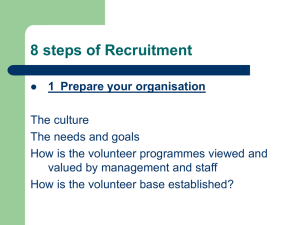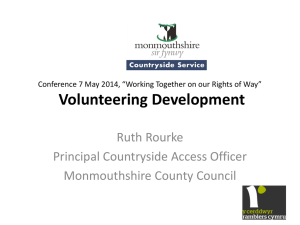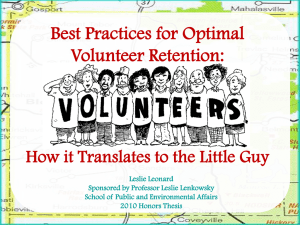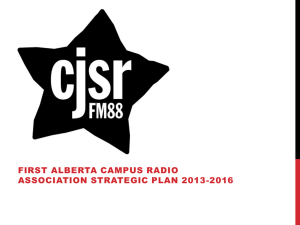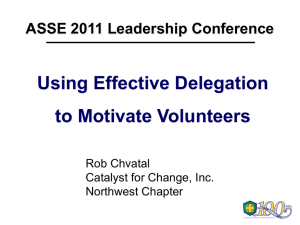Volunteer-recruitment
advertisement
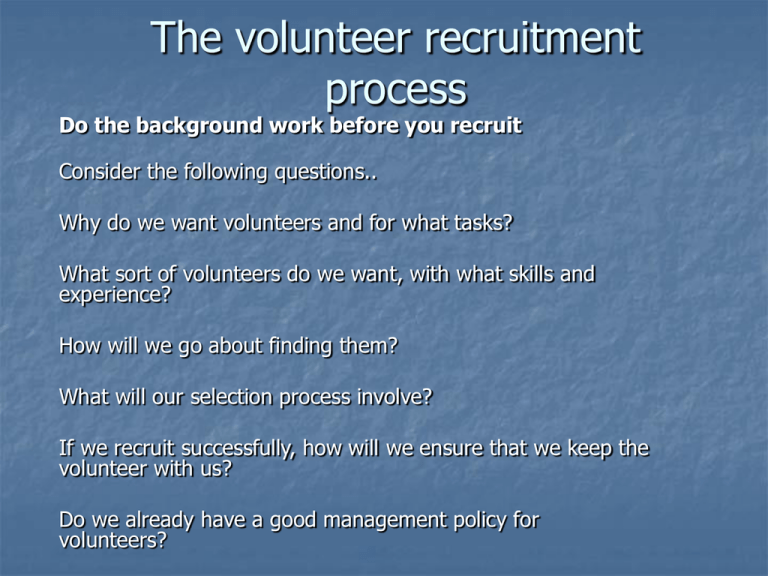
The volunteer recruitment process Do the background work before you recruit Consider the following questions.. Why do we want volunteers and for what tasks? What sort of volunteers do we want, with what skills and experience? How will we go about finding them? What will our selection process involve? If we recruit successfully, how will we ensure that we keep the volunteer with us? Do we already have a good management policy for volunteers? Recruitment Styles Warm Body Recruitment When you need a large number of volunteers for a short period time and the qualifications of the task are minimal, you might engage in "warm body recruitment." Targeted Recruitment The targeted campaign requires a carefully planned approach to a small audience. Use this method when you are trying to recruit volunteers that need to have specific skills or not commonly found characteristics. Concentric Circles Recruitment Concentric Circles recruitment involves people who are already familiar with your agency or the problem you address, or who are connected through friends or staff members. It is more likely that you will succeed in persuading them to volunteer than complete strangers. In sales terms, there is a big difference between a "cold" call to a stranger than a "warm" call to an acquaintance or a friend. Get the word out that you are recruiting volunteers Advertising for new volunteers requires you to: prepare a 'case for support' – your message to potential volunteers decide the ways in which you will recruit be persistent and patient! Methods of Volunteer Recruitment There are lots of ways of advertising for volunteers. These include: word of mouth leaflets and other printed media using Volunteer Centre databases organising or speaking at events during Volunteer Week press / radio adverts online - on your own website and via volunteer recruitment websites. Whichever methods you chose, make sure potential volunteers can get in touch easily by including a phone number or email address. Case for support - your message to potential volunteers The case for support should explain in reader-friendly language: what the organisation does and what cause or people it benefits the range of volunteer opportunities that exist the difference a volunteer can make to the cause or the people what the volunteer can gain from working with the organisation how prospective volunteers can find out more. Persistence and patience when recruiting volunteers Don’t panic if you are just starting out and it seems to be taking a lot of time and effort. The time and effort are worth it. Passionate advocacy may not always attract the volunteers that are so badly needed – but persistence and creativity will eventually pay off. Volunteering is deeply engrained in the British psyche - one in seven of the population is already a volunteer so it is not a new idea. It's worth bearing in mind that asking a busy person may be more likely to result in a new volunteer than finding someone who has never volunteered. Online methods of recruitment can be especially attractive to younger people. Examples of online approaches to encouraging people into volunteering include Vinspired Volunteer applications Designing a simple form for applicants will help make sure the recruitment of volunteers is taking account of equal opportunities and diversity policy. Where appropriate ensure different languages or inclusive images are used. You also need to be conscious about accessibility for people with disabilities. Asylum seekers, volunteers from overseas and ex-offenders are allowed to volunteer. If necessary, appropriate legal guidance should be sought from one of the national centres. Be ready to have an informal chat on the phone. Volunteer interviews Interviews should not be overly formal – people are offering a gift of time, not seeking paid employment. The great temptation in interviewing is for the interviewer to talk too much about the organisation and not leave time for the potential volunteer to talk about themselves. A simple ‘person specification’ can be a useful template for the interview. A second is an exploration of why the applicant wants to volunteer. Motivations might include: a belief in the organisation’s cause wanting to use skills and give something back Volunteer interviews Continued trying out or learning new skills (if the person is older or unemployed) to keep active gaining experience in a field of activity they hope to enter social contact and meeting people. Exploring these points in an interview and keeping a record of the answers is a demonstration of good interview practice. Make sure the volunteer role or roles are understood and give time for the applicant to raise any questions or concerns. Doing this will help to bring the interview to an end. It's also important that you're ready to explain any requirements that need to be met before appointment and the support that will be available
